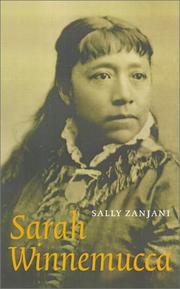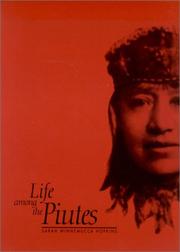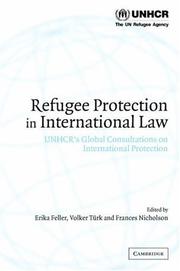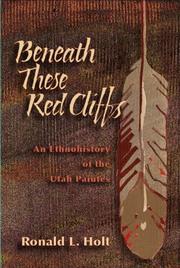| Listing 1 - 10 of 21 | << page >> |
Sort by
|

ISBN: 1280374187 9786610374182 0803203039 9780803203037 9781280374180 0803249179 9780803249172 661037418X Year: 2001 Publisher: Lincoln University of Nebraska Press
Abstract | Keywords | Export | Availability | Bookmark
 Loading...
Loading...Choose an application
- Reference Manager
- EndNote
- RefWorks (Direct export to RefWorks)
"Born in a Paiute community in western Nevada at a time when the Paiutes' homeland and traditional way of life were increasingly threatened, Sarah [Winnemucca] dedicated much of her life to working for her people. She played an instrumental and controversial role as interpreter and messenger for the U.S. Army during the Bannock War of 1878 and traveled to Washington in 1880 to obtain the release of her people from confinement on the Yakama reservation. She toured the East Coast in the 1880s, tirelessly giving speeches about the plight of her people and heavily criticizing the reservation system. In 1883 she produced her autobiography - the first written by a Native American woman. Using private contributions, she returned to Nevada and founded a Native school whose educational practices and standards were far ahead of its time. [This book is] composed not only of public challenges and accomplishments but also of private struggles, joys, and ambitions. Unforgettable glimpses of her personality and private life leap from these pages: her notorious sharp tongue and wit, her love of performance, her place in a legendary family of Paiute leaders, her long string of failed relationships, and, at the end, possible poisoning by a romantic rival."--Jacket.
Paiute Indians --- Pah-Ute Indians --- Piute Indians --- Indians of North America --- Numic Indians --- Government relations. --- Hopkins, Sarah Winnemucca,

ISBN: 0874173981 9780874173987 9780874172522 0874172527 Year: 1994 Publisher: Reno Las Vegas
Abstract | Keywords | Export | Availability | Bookmark
 Loading...
Loading...Choose an application
- Reference Manager
- EndNote
- RefWorks (Direct export to RefWorks)
Paiute Indians. --- Paiute Indians --- Pah-Ute Indians --- Piute Indians --- Indians of North America --- Numic Indians --- Hopkins, Sarah Winnemucca, --- Thocmetony, --- Shell Flower,
Book
ISBN: 0803276613 080327663X 9780803276635 0803276621 9780803276628 9780803276611 9780803243682 0803243685 9780803276611 9780803276628 Year: 2015 Publisher: Lincoln
Abstract | Keywords | Export | Availability | Bookmark
 Loading...
Loading...Choose an application
- Reference Manager
- EndNote
- RefWorks (Direct export to RefWorks)
Indians, Treatment of --- Paiute Indians --- Pah-Ute Indians --- Piute Indians --- Indians of North America --- Numic Indians --- Politics and government. --- Social conditions. --- Government relations. --- Hopkins, Sarah Winnemucca, --- Thocmetony, --- Shell Flower,
Book
ISBN: 1607815036 9781607815037 9781607815020 1607815028 Year: 2016 Publisher: Salt Lake City The University of Utah Press
Abstract | Keywords | Export | Availability | Bookmark
 Loading...
Loading...Choose an application
- Reference Manager
- EndNote
- RefWorks (Direct export to RefWorks)
Ethnology --- Indians of North America --- Paiute Indians --- Paiute Indians. --- Pah-Ute Indians --- Piute Indians --- Numic Indians --- American aborigines --- American Indians --- First Nations (North America) --- Indians of the United States --- Indigenous peoples --- Native Americans --- North American Indians --- Cultural anthropology --- Ethnography --- Races of man --- Social anthropology --- Anthropology --- Human beings --- Social life and customs. --- Material culture. --- Culture

ISBN: 1107137756 1280431091 0511062486 0511179340 051120325X 0511307101 0511493975 0511070942 9780511179341 9780511070945 9780511062483 0521825741 0521532817 9780521825740 9780521532815 9780511493973 Year: 2003 Publisher: Cambridge, UK New York Cambridge University Press
Abstract | Keywords | Export | Availability | Bookmark
 Loading...
Loading...Choose an application
- Reference Manager
- EndNote
- RefWorks (Direct export to RefWorks)
Millions of people are today forced to flee their homes as a result of conflict, systematic discrimination, or other forms of persecution. The core instruments on which they must rely to secure international protection are the 1951 Convention Relating to the Status of Refugees and its 1967 Protocol. This book examines key challenges that the Convention faces, including the scope of the principle of non-refoulement and the proper application of the elements of the refugee definition. The Office of the United Nations High Commissioner for Refugees (UNHCR) commissioned papers on these issues from some of the world's pre-eminent international refugee lawyers, discussed at a series of expert roundtable meetings during 2001 as part of UNHCR's Global Consultations on International Protection. The papers and roundtable conclusions are published here, together with an introduction and the landmark declaration of the 2001 Ministerial Meeting of States Parties to the Convention and/or Protocol.
Refugees --- Displaced persons --- Persons --- Aliens --- Deportees --- Exiles --- Legal status, laws, etc. --- Convention Relating to the Status of Refugees --- Da Panāh Ghūṣhtūnko da Waz̤ʻe pah Aṛah Muqāwalah (Kunwānsiyūn) --- Konvensi Mengenai Kedudukan Pengungsi --- Kunvānsiyūn-i 1951 dar Umūr-i Panāhindahʹgān --- Refugee Convention --- United Nations Refugee Convention --- Legal status, laws, etc --- Réfugiés --- Droit --- Congresses. --- Law --- General and Others
Book
ISBN: 0295806699 9780295806693 9780295998343 0295998342 9780295998350 0295998350 Year: 2016 Publisher: Seattle
Abstract | Keywords | Export | Availability | Bookmark
 Loading...
Loading...Choose an application
- Reference Manager
- EndNote
- RefWorks (Direct export to RefWorks)
"Most California histories begin with the arrival of the Spanish missionaries in the late eighteenth century and skip to the Gold Rush of 1849. Noticeably absent from these stories are the perspectives and experiences of the people who lived on the land long before European settlers arrived. Historian William Bauer seeks to correct that oversight through an approach that tells California history strictly through Native perspectives. Using oral histories of Concow, Pomo, and Paiute workers, taken as part of a New Deal federal works project, Bauer reveals how Native peoples have experienced and interpreted the history of the land we now call California. Combining these oral histories with creation myths and other oral traditions, he demonstrates the importance of sacred landscapes and animals and other nonhuman actors to the formation of place and identity. He also examines tribal stories of ancestors who prophesized the coming of white settlers and uses their recollections of the California Indian Wars to counteract popular narratives that downplay Native resistance. The result challenges the "California story" and enriches it with new voices and important points of view."--Provided by publisher.
Indians, Treatment of --- Indians of North America --- Indian mythology --- Paiute Indians --- Pomo Indians --- Konkow Indians --- Indians --- American aborigines --- American Indians --- First Nations (North America) --- Indians of the United States --- Indigenous peoples --- Native Americans --- North American Indians --- Mythology, Indian --- Mythology --- Pah-Ute Indians --- Piute Indians --- Numic Indians --- Kulanapan Indians --- Concow Indians --- Concow Maidu Indians --- Kojo:mk'awi Indians --- Konkow Maidu Indians --- Northwestern Maidu Indians --- Maidu Indians --- Wars. --- Folklore. --- History. --- Government relations --- Culture --- Ethnology --- Religion and mythology

ISBN: 0874216370 9786613078025 0874215420 1283078023 9780874215427 9781283078023 9780874216370 Year: 2006 Publisher: Logan, UT Utah State University Press
Abstract | Keywords | Export | Availability | Bookmark
 Loading...
Loading...Choose an application
- Reference Manager
- EndNote
- RefWorks (Direct export to RefWorks)
Ronald Holt recounts the survival of a people against all odds. A compound of rapid white settlement of the most productive Southern Paiute homelands, especially their farmlands near tributaries of the Colorado River; conversion by and labor for the Mormon settlers; and government neglect placed the Utah Paiutes in a state of dependency that ironically culminated in the 1957 termination of their status as federally recognized Indians. That recognition and attendant services were not restored until 1980, in an act that revived the Paiutes' identity, self-government, land ownership, and sense of
Mormons -- History -- Sources. --- Mormons -- Social conditions. --- Paiute Indians -- Government relations. --- Paiute Indians -- History -- Sources. --- Paiute Indians -- Social conditions. --- Paiute Indians --- Mormons --- Gender & Ethnic Studies --- Social Sciences --- Ethnic & Race Studies --- History --- Government relations --- Social conditions --- Government relations. --- Social conditions. --- Latter-Day Saints --- Pah-Ute Indians --- Piute Indians --- Mormon Church --- Indians of North America --- Numic Indians --- Christians --- Latter Day Saints --- Brighamite Mormons --- Church of Christ (Temple Lot) members --- Church of Jesus Christ of Latter-day Saints members --- Church of Jesus Christ (Strangites) members --- Hedrikites --- Josephite Mormons --- Reorganized Church of Jesus Christ of Latter Day Saints members --- Reorganized Mormons --- RLDS Mormons --- Strangite Mormons --- Temple Lot Mormons --- Utah Mormons
Book
ISBN: 9780199542512 0199542511 Year: 2011 Publisher: Oxford: Oxford university press,
Abstract | Keywords | Export | Availability | Bookmark
 Loading...
Loading...Choose an application
- Reference Manager
- EndNote
- RefWorks (Direct export to RefWorks)
Refugees --- International law. --- Legal status, laws, etc. --- Convention Relating to the Status of Refugees --- International law --- Law of nations --- Nations, Law of --- Public international law --- Law --- Legal status, laws, etc --- Da Panāh Ghūṣhtūnko da Waz̤ʻe pah Aṛah Muqāwalah (Kunwānsiyūn) --- Konvensi Mengenai Kedudukan Pengungsi --- Kunvānsiyūn-i 1951 dar Umūr-i Panāhindahʹgān --- Refugee Convention --- United Nations Refugee Convention --- Réfugiés --- Droit international --- Statut juridique --- Nations Unies. --- Nations Unies --- Refugees - Legal status, laws, etc --- Réfugiés
Book
ISBN: 058545972X 9780585459721 Year: 2003 Publisher: Lanham, Md. Lexington Books
Abstract | Keywords | Export | Availability | Bookmark
 Loading...
Loading...Choose an application
- Reference Manager
- EndNote
- RefWorks (Direct export to RefWorks)
Refugees --- Forced migration --- Population transfers --- Cleansing, Ethnic --- Ethnic cleansing --- Ethnic purification --- Exchange of population --- Exchanges, Population --- Interchange of population --- Interchanges, Population --- Population exchanges --- Population interchanges --- Purification, Ethnic --- Transfer of population --- Transfers, Population --- Emigration and immigration --- Minorities --- Compulsory resettlement --- Involuntary resettlement --- Migration, Forced --- Relocation, Forced --- Resettlement, Involuntary --- Migration, Internal --- Displaced persons --- Persons --- Aliens --- Deportees --- Exiles --- Legal status, laws, etc. --- Convention Relating to the Status of Refugees --- Da Panāh Ghūṣhtūnko da Waz̤ʻe pah Aṛah Muqāwalah (Kunwānsiyūn) --- Konvensi Mengenai Kedudukan Pengungsi --- Kunvānsiyūn-i 1951 dar Umūr-i Panāhindahʹgān --- Refugee Convention --- United Nations Refugee Convention
Book
ISBN: 1108216587 1108207138 1108215238 1316612198 1316671445 1108217931 1108219284 1108224687 1107159318 1108223338 9781108224680 9781107159310 9781316671443 9781316612194 Year: 2017 Publisher: Cambridge Cambridge University Press
Abstract | Keywords | Export | Availability | Bookmark
 Loading...
Loading...Choose an application
- Reference Manager
- EndNote
- RefWorks (Direct export to RefWorks)
Voting Rights of Refugees develops a novel legal argument about the voting rights of refugees recognised in the 1951 Geneva Convention. The main normative contention is that such refugees should have the right to vote in the political community where they reside, assuming that this community is a democracy and that its citizens have the right to vote. The book argues that recognised refugees are a special category of non-citizen residents: they are unable to participate in elections of their state of origin, do not enjoy its diplomatic protection and consular assistance abroad, and are unable or unwilling, owing to a well-founded fear of persecution, to return to it. Refugees deserve to have a place in the world, in the Arendtian sense, where their opinions are significant and their actions are effective. Their state of asylum is the only community in which there is any prospect of political participation on their part.
Refugees --- Suffrage. --- Citizenship. --- Birthright citizenship --- Citizenship --- Citizenship (International law) --- National citizenship --- Nationality (Citizenship) --- Political science --- Public law --- Allegiance --- Civics --- Domicile --- Political rights --- Franchise --- Right to vote --- Suffrage --- Voting rights --- Plebiscite --- Representative government and representation --- Voting --- Legal status, laws, etc. --- Law and legislation --- Convention Relating to the Status of Refugees --- Da Panāh Ghūṣhtūnko da Waz̤ʻe pah Aṛah Muqāwalah (Kunwānsiyūn) --- Konvensi Mengenai Kedudukan Pengungsi --- Kunvānsiyūn-i 1951 dar Umūr-i Panāhindahʹgān --- Refugee Convention --- United Nations Refugee Convention
| Listing 1 - 10 of 21 | << page >> |
Sort by
|

 Search
Search Feedback
Feedback About UniCat
About UniCat  Help
Help News
News